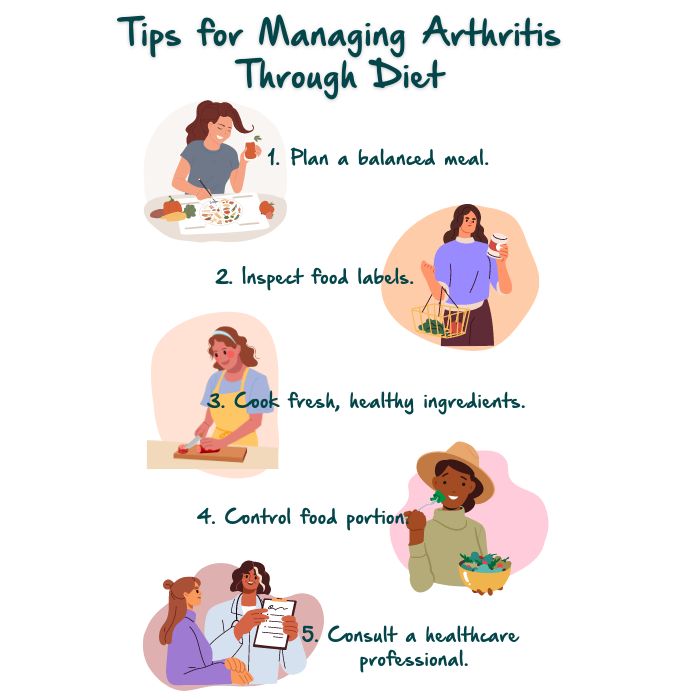Arthritis can feel like a silent thief, stealing your mobility, your joy, and your independence, one aching joint at a time. Imagine waking up every morning to a body that feels like it’s been in a battle. Stiffness, pain, and swelling can make even the simplest tasks feel like a Herculean effort.
Living with arthritis is a constant challenge, and finding relief can sometimes feel like searching for a needle in a haystack. But what if the answer to easing your arthritis symptoms was as close as your kitchen?
Let’s dive into the list of foods and discover which culprits could be perpetuating your discomfort and which foods might just be your secret weapon against arthritis pain.
Understanding Arthritis: A Closer Look
Arthritis is an umbrella term for over 100 different diseases that cause pain, swelling, and stiffness in your joints. Two of the most familiar types are osteoarthritis and rheumatoid arthritis.
Osteoarthritis, commonly known as “wear and tear” arthritis, occurs when the cartilage that cushions your joints gradually deteriorates over time. On the other hand, rheumatoid arthritis occurs when the immune system mistakenly attacks the lining of your joints, causing inflammation.
Inflammation is the body’s natural response to injury or infection. It’s a protective mechanism that sends white blood cells to the affected area to fight off invaders. However, in conditions like arthritis, this inflammatory response goes into overdrive, causing persistent pain, swelling, and stiffness.
Now, here’s where things get interesting: there’s a growing body of evidence suggesting a strong connection between diet and inflammation.
What you eat can either fuel the fire of inflammation or help to quench it. Stay tuned as we explore the foods that could be aggravating your arthritis symptoms and those that might offer some much-needed relief.
5 Inflammatory Foods: The Hidden Culprits
So, you’ve got a handle on what arthritis is and how inflammation plays a role. Let’s talk about the foods to avoid with arthritis that might be fueling that inflammatory fire.
1. Processed Foods

Processed foods, those convenient, ready-to-eat options, often contain hidden culprits like excessive sodium, unhealthy fats, and added sugars. These are among the foods to avoid with arthritis as they can significantly contribute to inflammation.
Sodium, commonly used in processed foods for flavor and preservation, can raise blood pressure and cause fluid retention, leading to chronic inflammation. Unhealthy fats, especially trans and certain saturated fats found in snacks and baked goods, increase inflammation by releasing pro-inflammatory chemicals. Added sugars in sweetened beverages, desserts, and savory items cause blood sugar and insulin spikes, further worsening soreness.
Chronic inflammation is a pivotal factor in developing and exacerbating arthritis, a condition characterized by joint pain and swelling. Research has consistently linked high consumption of processed foods [¹] to elevated levels of inflammation in the body.
These markers are indicators of systemic inflammation, which can worsen arthritis symptoms and contribute to the progression of the disease.
Therefore, reducing the intake of processed foods and opting for a diet rich in whole, unprocessed foods can be beneficial in managing inflammation and improving overall health.
2. Red Meat

Red meat has been a dietary staple for ages, providing essential nutrients like protein, iron, and vitamin B12.
However, its role in arthritis and inflammation is a topic of ongoing debate among researchers. Some studies indicate that red meat [²] may be among the foods to avoid with arthritis as it can contribute to inflammation, potentially exacerbating arthritis symptoms. contribute to inflammation, potentially exacerbating arthritis symptoms. This is primarily attributed to the presence of saturated fats and advanced glycation end products (AGEs) in red meat, which can promote inflammatory responses in the body.
Additionally, certain red meats contain omega-6 fatty acids, which can contribute to inflammation when consumed more than what is recommended.
On the other hand, not all research agrees on the negative impact of red meat. Some research suggests that when consumed in moderation, lean cuts of red meat do not significantly contribute to inflammation and may be included in a balanced diet without adverse effects on arthritis.
The American Institute for Cancer Research and other health organizations recommend limiting red meat intake to no more than 18 ounces or 510 grams per week to lessen the risk of chronic diseases and inflammation.
For individuals sensitive to inflammation or managing arthritis, it may be beneficial to reduce red meat intake or choose leaner options such as grass-fed beef, which contains higher levels of anti-inflammatory omega-3 fatty acids.
3. Dairy

Dairy products, including cheese, milk, and yogurt, are well-known for being rich sources of calcium, which is essential for maintaining strong bones.
Calcium plays a significant role in building and maintaining bone density, which is specifically important for preventing osteoporosis and other bone-related conditions.
However, for some individuals with arthritis, consuming dairy products can potentially worsen their symptoms. This adverse reaction might be due to lactose intolerance, a common condition where the body cannot properly digest lactose, leading to digestive issues that can indirectly exacerbate inflammation.
Additionally, some people may have sensitivities or allergies to proteins found in dairy, such as casein, which can trigger inflammatory responses and aggravate arthritis symptoms. Therefore, dairy products may be among the foods to avoid with arthritis for certain individuals.
If you suspect that dairy products might be contributing to your arthritis flare-ups or discomfort, it is worth considering dairy-free alternatives.
There are many options available today, such as soy milk, almond milk, coconut milk, and other plant-based dairy substitutes, which can provide essential nutrients without the potential inflammatory effects of traditional dairy.
4. Gluten

While there is no definitive scientific proof that gluten directly causes arthritis, some individuals with arthritis [³] report improvements in their symptoms when they adopt a gluten-free diet. This anecdotal evidence suggests that gluten might exacerbate inflammation or trigger immune responses that could potentially worsen arthritis symptoms in certain people.
The connection between gluten and arthritis may be more noticeable in individuals with a genetic predisposition to autoimmune conditions or those with coexisting conditions like celiac disease.
For those with arthritis, experimenting with a gluten-free diet could be beneficial. This applies to removing all sources of gluten from the diet, including foods made from wheat, barley, and rye, and observing any changes in symptoms over a period of time.
Many gluten-free alternatives are available today, such as rice, quinoa, and gluten-free oats, which can make this dietary transition easier.
5. Sugary Foods

We all enjoy a bit of sweetness in our diet, but consuming excessive sugar can harm your body, particularly by fueling inflammation. High sugar intake is common in many foods, from sodas and sugary cereals to baked goods and candy.
These hidden sources of sugar can lead to spikes in insulin levels and blood glucose, which can trigger inflammatory responses. For individuals with arthritis, this inflammation can exacerbate symptoms such as joint pain and swelling, making sugar one of the foods to avoid with arthritis.
Additionally, high sugar consumption can contribute to weight gain, placing extra stress on joints and further aggravating arthritis. To manage arthritis symptoms more effectively, it’s wise to restrict sugar intake and opt for healthier, natural sources of sweetness, like fruits.
Tips for Managing Arthritis Through Diet

1. Meal Planning for People with Arthritis:
- Plan balanced meals with anti-inflammatory foods such as whole grains, vegetables, fruits, lean proteins, and healthy fats.
- Incorporate omega-3-rich foods like salmon, flaxseeds, and walnuts.
2. Reading Food Labels to Identify Hidden Inflammatory Ingredients:
- Check for added sugars, trans fats, and high sodium content.
- Avoid foods with artificial additives and preservatives.
3. Cooking at Home to Control Ingredients:
- Use fresh, whole ingredients to reduce exposure to inflammatory substances.
- Experiment with herbs and spices like turmeric and ginger for their anti-inflammatory properties.
4. Portion Control and Its Importance:
- Reduce stress on joints by maintaining a healthy weight.
- Use smaller plates and measure portions to avoid overeating.
5. Consulting a Healthcare Professional for Personalized Advice:
- Seek guidance from a dietitian or doctor to tailor your diet to your specific needs.
- Discuss potential food sensitivities or allergies that may affect your arthritis.
Conclusion
Arthritis can be a challenging condition, but understanding the role of diet can be a powerful tool in managing your symptoms. By being mindful of processed foods, red meat, dairy (for some), gluten, sugar, and possibly nightshades, you can take steps to relieve inflammation in your body.
Remember, managing arthritis is a holistic approach. While diet plays a crucial role, it’s essential to combine it with other healthy lifestyle factors like adequate sleep, stress management, and regular exercise. These elements work together to boost your overall well-being and can significantly impact your arthritis symptoms.
It’s important to emphasize that this information is not a substitute for professional medical advice. Always consult with a medical professional to formulate a personalized plan designed for your specific needs and conditions.
References
1.https://doi.org/10.3390/nu14081554
2. https://doi.org/10.1038/s41598-021-85035-6
3. https://doi.org/10.4081/reumatismo.2020.1296







